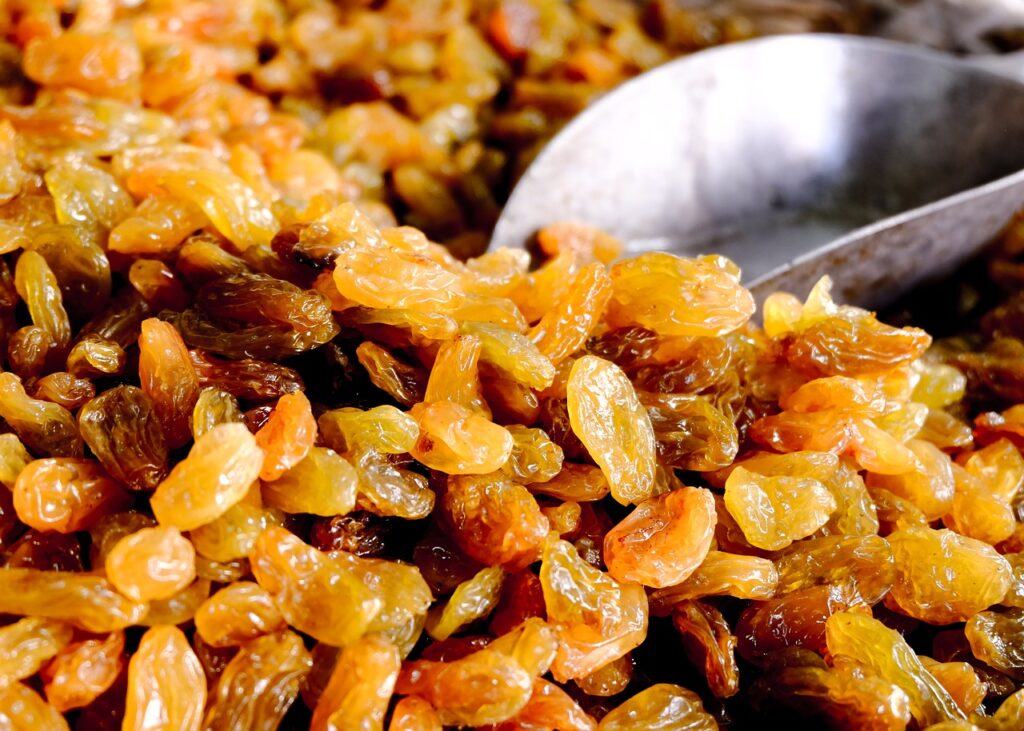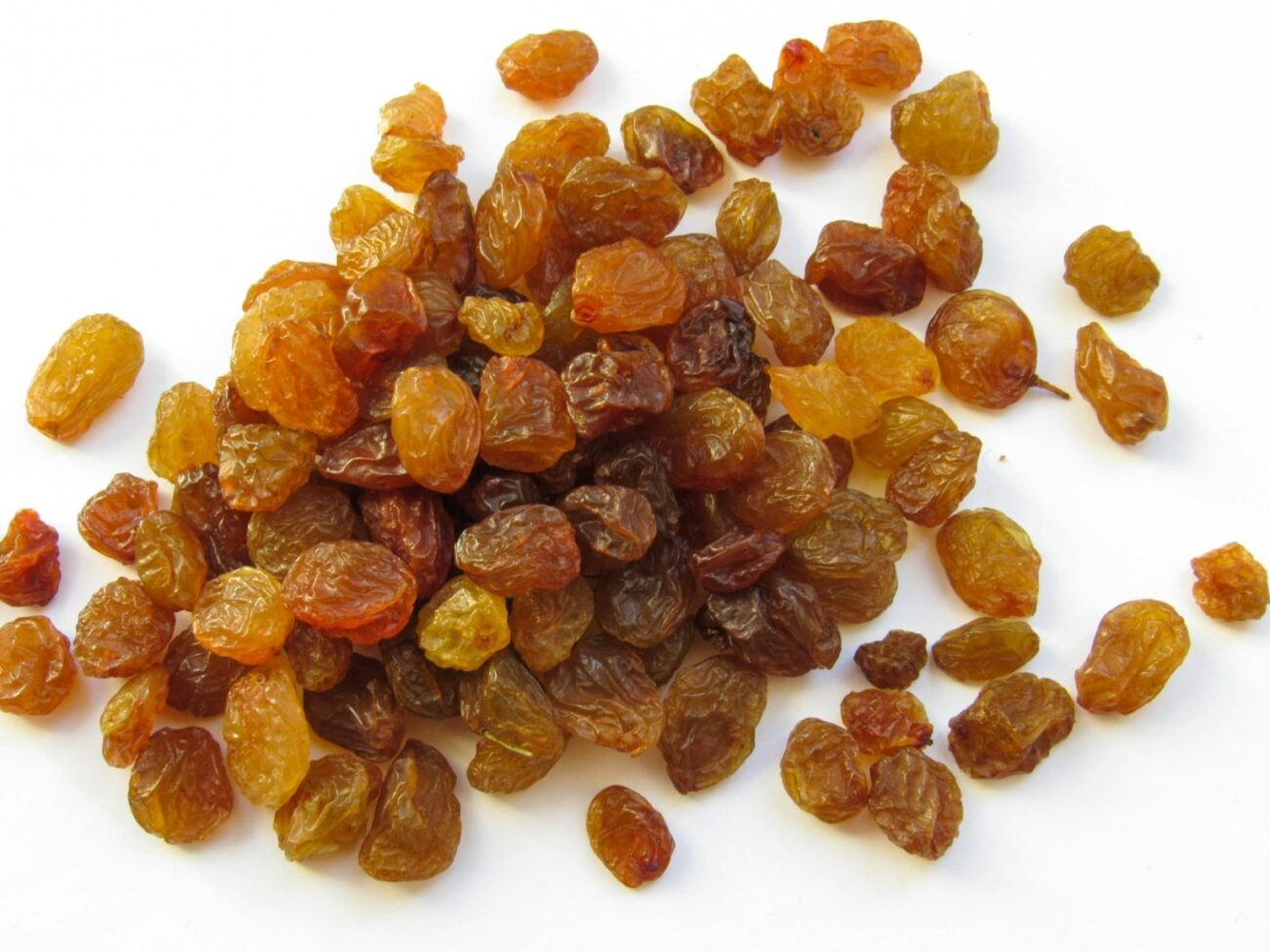Raisins, those small, wrinkled, and naturally sweet dried fruits, have been enjoyed for centuries as a convenient and nutritious snack. Made by drying grapes, raisins are packed with essential nutrients, making them a healthy addition to your diet. Whether eaten on their own, added to oatmeal, or used in baking, raisins offer a burst of flavor and a host of health benefits.
But like any food, they come with considerations.
Let’s explore the benefits, recommendations, and potential contraindications of raisins.
What Are Raisins?
Raisins are dried grapes, typically made from varieties like Thompson Seedless, Flame, or Muscat. The drying process concentrates the natural sugars and nutrients, resulting in a sweet, chewy, and shelf-stable snack. Raisins come in different colors, including golden, black, and green, depending on the grape variety and drying method.
Despite their small size, raisins are nutrient-dense and offer a surprising array of health benefits.
Nutritional Profile of Raisins
Raisins are a rich source of vitamins, minerals, and antioxidants. Here’s a breakdown of their nutritional value:
- Natural Sugars: Provide quick energy.
- Fiber: Supports digestive health and promotes satiety.
- Iron: Helps prevent anemia and supports oxygen transport in the blood.
- Potassium: Regulates blood pressure and supports heart health.
- Antioxidants: Including polyphenols, which protect cells from oxidative damage.
- B Vitamins: Such as B6, which supports metabolism and brain function.
Health Benefits of Raisins
- Supports Digestive Health
Raisins are high in dietary fiber, which promotes regular bowel movements and prevents constipation. They also contain prebiotics, which feed the beneficial bacteria in your gut, supporting a healthy microbiome. - Boosts Energy Levels
The natural sugars in raisins, such as fructose and glucose, provide a quick source of energy, making them an excellent snack for athletes or anyone needing a mid-day pick-me-up. - Promotes Heart Health
Raisins are rich in potassium, which helps regulate blood pressure, and antioxidants, which reduce inflammation and oxidative stress. Their fiber content also helps lower LDL (bad) cholesterol levels. - Supports Bone Health
Raisins contain calcium and boron, two nutrients essential for maintaining strong bones and preventing osteoporosis. - Aids in Iron Deficiency Prevention
Raisins are a good source of iron, making them a helpful snack for individuals at risk of anemia, especially vegetarians and vegans. - Rich in Antioxidants
The polyphenols in raisins help neutralize free radicals, reducing oxidative stress and lowering the risk of chronic diseases like heart disease and cancer. - May Improve Oral Health
Contrary to popular belief, raisins may benefit oral health. Compounds like oleanolic acid in raisins can inhibit the growth of harmful bacteria in the mouth, reducing the risk of cavities and gum disease.
Recommendations for Enjoying Raisins
Raisins are incredibly versatile and can be enjoyed in many ways:
- As a Snack: Eat them on their own for a quick and healthy energy boost.
- In Breakfast: Add them to oatmeal, cereal, or yogurt for natural sweetness.
- In Baking: Use them in cookies, muffins, or bread for added flavor and texture.
- In Salads: Sprinkle raisins on salads for a touch of sweetness and chewiness.
- In Trail Mix: Combine raisins with nuts and seeds for a nutritious snack.
When purchasing raisins, opt for unsweetened varieties to avoid added sugars. Organic options are also available for those looking to minimize pesticide exposure.
Potential Contraindications
While raisins are generally safe and healthy, there are a few considerations to keep in mind:
- High Sugar Content
Raisins are calorie-dense and high in natural sugars, so portion control is important, especially for individuals with diabetes or those watching their sugar intake. - Dental Health
While raisins may have some oral health benefits, their sticky texture can cling to teeth, potentially contributing to cavities if proper oral hygiene isn’t maintained. - Sulfites Sensitivity
Some commercially available raisins are treated with sulfites to preserve their color. Individuals with sulfite sensitivity or asthma may experience allergic reactions and should opt for sulfite-free varieties. - FODMAPs
Raisins contain FODMAPs (fermentable carbohydrates), which can cause digestive discomfort in individuals with irritable bowel syndrome (IBS) or sensitivities to these compounds. - Caloric Density
Due to their high calorie content, overconsumption of raisins can contribute to weight gain if not balanced with physical activity and a healthy diet.

Raisins are a delicious, convenient, and nutrient-packed snack that offers a wide range of health benefits. From supporting digestion and heart health to boosting energy and providing essential nutrients, these little dried fruits are a powerhouse of nutrition. However, it’s important to enjoy them in moderation and be mindful of potential contraindications, especially if you have specific dietary restrictions or health conditions.
So, the next time you’re looking for a sweet and satisfying snack, reach for a handful of raisins – your body will thank you for the natural goodness!
How do you like to enjoy raisins?
Share your favorite recipes and snack ideas in the comments below!

